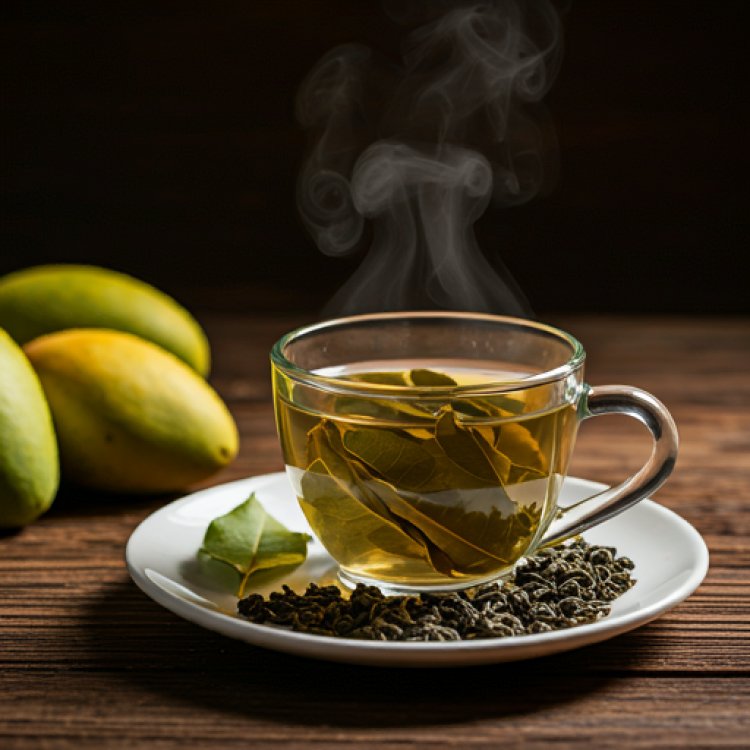The Hidden Benefits of Mango Leaf Tea: A Natural Remedy for Everyday Ailments
Share this Post to earn Money ( Upto ₹100 per 1000 Views )

How Can Mango Leaf Tea Transform Your Daily Wellness Routine?
People enjoy mangoes for their sweet, juicy flesh, but few people realize that the leaves of the mango tree also hold a treasure trove of health benefits. Mango leaves has emerged as a natural remedy for various everyday ailments, making it a worthy addition to your wellness routine. Beyond its delightful flavor and aroma, mango leaf tea is rich in nutrients and antioxidants, offering numerous advantages that can improve your overall health.
In this blog post, we will explore the hidden benefits of mango leaf tea and why you should consider adding this herbal infusion into your daily life.
The Nutritional Benefits of Mango Leaves
Mango leaves are packed with vitamins and minerals, making them a powerhouse of nutrition. They contain:
- Vitamins A, C, and E: Essential for maintaining healthy skin and boosting the immune system.
- B vitamins: Important for energy production and metabolism.
- Minerals: Including potassium, calcium, and magnesium, which are vital for various bodily functions.
In addition to these nutrients, mango leaves are known for their rich content of flavonoids and polyphenols, potent antioxidants that can protect your body from oxidative stress.
What Makes Mango Leaf Tea Special?
The tea has a mild, pleasant flavor with a hint of sweetness, making it an enjoyable beverage to sip throughout the day. Mango leaf tea is made by steeping fresh or dried mango leaves in hot water. But what truly sets mango leaf tea apart are its remarkable health benefits:
1. Blood Sugar Regulation
Research suggests that the compounds found in mango leaves can improve insulin sensitivity and regulate blood sugar levels, making it a beneficial drink for those with diabetes or at risk of developing the condition. Mango leaves have been traditionally used in herbal medicine to help manage blood sugar levels. Including mango leaf tea in your daily routine may help maintain stable blood sugar levels and reduce cravings for sugary foods.
2. Digestive Health
The leaves contain tannins and alkaloids that can aid in digestion and alleviate common gastrointestinal problems such as bloating, gas, and indigestion. Sipping on this soothing tea after meals may help support your digestive system and promote a healthier gut. If you struggle with digestive issues, mango leaf tea could be your new best friend
3. Rich in Antioxidants
The antioxidants present in mango leaves, such as quercetin and kaempferol, can help combat oxidative stress in the body. This is crucial for preventing chronic diseases and promoting overall health. By drinking mango leaf tea regularly, you can provide your body with the antioxidant support it needs to fight off free radicals and stay healthy.
4. Anti-Inflammatory Properties
Regularly consuming mango leaf tea may help reduce inflammation in the body, leading to improved joint health and reduced discomfort. Mango leaves possess anti-inflammatory properties that can benefit those suffering from inflammatory conditions, such as arthritis.
5. Respiratory Health
Mango leaf tea is known for its ability to alleviate respiratory issues, such as coughs and bronchitis. The anti-inflammatory and antimicrobial properties of mango leaves can help soothe the throat and promote respiratory health. Drinking this tea when feeling under the weather may provide comfort and relief from symptoms.
6. Skin Health
The antioxidants and vitamins found in mango leaves can also promote healthy skin. Mango leaf tea can be consumed for internal benefits, while a cooled infusion can be used topically to soothe minor skin irritations and reduce inflammation. This dual approach makes mango leaf tea a versatile remedy for enhancing skin health.
How to Prepare Mango Leaf Tea
Making mango leaf tea is simple and requires only a few ingredients:
Ingredients
- Fresh or dried mango leaves (about 5-6 leaves)
- 2 cups of water
- Honey or lemon (optional, for flavor)
Instructions
- Prepare the Leaves: If using fresh mango leaves, wash them thoroughly to remove any dirt or impurities. If using dried leaves, ensure they are clean and free from additives.
- Boil Water: In a saucepan, bring 2 cups of water to a boil.
- Steep the Leaves: Once the water is boiling, add the mango leaves and reduce the heat. Let the leaves steep for about 10-15 minutes.
- Strain and Serve: Remove from heat, strain the tea into a cup, and sweeten with honey or add a splash of lemon if desired.
- Enjoy: Sip on this refreshing herbal tea warm or allow it to cool and serve over ice.
Sip Your Way to Wellness
Incorporating mango leaf tea into your daily routine can be a delicious and effective way to support your health. With its myriad benefits, ranging from blood sugar regulation to improved digestion and skin health, this herbal infusion is more than just a beverage; it’s a natural remedy for everyday ailments.
Don’t miss out on the hidden benefits of this incredible tea! Start brewing your own mango leaf tea today and discover how it can enhance your overall wellness.
















